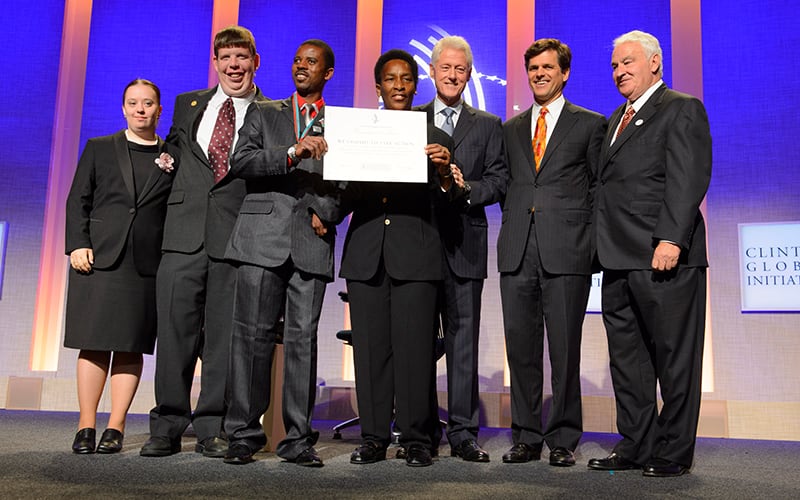Clinton Global Initiative Commitment to Action Creates “Healthy Communities” for Athletes with Intellectual Disabilities – Press Conference is 3:45 PM Sunday September 23 with President Clinton, Tom Golisano and Tim Shriver
Former President William J. Clinton announced today that businessman and philanthropist Tom Golisano will provide $12 million to expand Special Olympics’ health-related services to people with intellectual disabilities – one of the largest and most medically underserved disability groups in the world – which will allow for the launch of a new Healthy Communities initiative. The commitment was made at the opening of the 2012 Clinton Global Initiative (CGI) Annual Meeting.
This is the largest single gift Special Olympics has ever received from an individual and it is the first gift made by Golisano that will have international impact. The gift will be given over four years.
Millions with intellectual disabilities lack access to quality health care and experience dramatically higher rates of preventable disease, chronic pain and suffering, and premature death in every country around the world.
Healthy Communities will be launched in seven countries (Mexico, Peru, Romania, Malawi, South Africa, Malaysia, and Thailand) and six states in the U.S. (Arizona, Florida, Kansas, New Jersey, Wisconsin and New York). It will build upon and broaden the scope of the current Healthy Athletes program, which has provided free health screenings and products to athletes for 15 years.
Healthy Communities’ goal is to achieve improved health outcomes for people with intellectual disabilities with the ultimate goal of ensuring that all are receiving health services and are able to reach their full potential. It will expand services to more athletes, increase partnerships with local organizations, expand the use of technology, and promote awareness of the health difficulties facing people with intellectual disabilities.
“This unprecedented gift by Tom Golisano is going to impact lives worldwide, and we are honored to have the opportunity to share this incredible news at the Clinton Global Initiative Annual Meeting,” said Special Olympics Chairman and CEO Timothy P. Shriver. “The stories of health disparity and need we hear are unbelievable. We know athletes with previously undiagnosed cancers, extremely low bone density, and a multitude of other ailments that were overlooked until they came to a Special Olympics Healthy Athletes event. This new funding opens the door to reach many more people in need, and we hope that others join us on the journey to provide health care to a community of people that so desperately need it.”
“This gift comes with my deep admiration for the work of Special Olympics over the ten-plus years since Healthy Athletes was founded,” said Tom Golisano. “To have harnessed the power of its global sports organization to deliver critical front-line healthcare to over one million athletes is nothing short of remarkable. We must do even more to eliminate the health disparities that people with intellectual disabilities face. I am dismayed that people with intellectual disabilities and their health needs and status remain largely invisible to practitioners, systems, governments and larger global health community. We must leverage Special Olympics network, brand and organizational assets to the fullest extent possible as well as seek other partners and organizations to bring sustainable, systemic change.”
Golisano added, “We chose to make this announcement at this year’s CGI Annual Meeting, where world leaders are convening to turn ideas into action and solve some of the world’s most pressing challenges, because it is our hope that this gift will generate additional support and resources from hospitals, universities, professional associations, other non-profit organizations, corporations and agencies world-wide.”
Golisano is the founding sponsor and major underwriter for eight consecutive years of the CGI Annual Meeting. Golisano’s first gift to Special Olympics International was in 2010, to conduct Healthy Athletes trainings of doctors and other health care providers from across the United States. That support allowed for the training, engagement and, activation of dozens of health professionals who were empowered to conduct Healthy Athletes clinics at Special Olympics events in their own communities. In addition, it allowed for the implementation of a new health practitioner training model that enhanced Special Olympics’ ability to respond to local training needs.
Healthy Communities
In addition to expanding on the seven Healthy Athletes health disciplines (vision, hearing, oral health, healthy lifestyles, general fitness, podiatry, and sports physicals), these new Healthy Communities will be able to address some of the most acute medical conditions, including diseases of extreme poverty such as malaria, tuberculosis, waterborne diseases, and others, as well as conditions more prevalent in developed countries (e.g. obesity, early onset chronic disease).
As detailed in Golisano’s CGI commitment, specific outcomes of Healthy Communities include:
- 1,580 additional Healthy Athletes clinics globally over four years providing services for approximately 260,000 additional athletes with ID.
- Training on the specific health needs of people with ID for approximately 5,000 health care professionals to lead or participate in clinics in their communities and provide care to others with intellectual disabilities when they return to their full-time jobs.
- 60 mini-grant awards to replicate and expand the work of the Healthy Community projects.
- Enhanced use of technology, including the creation of 96,000 athlete electronic health records.
The Healthy Communities locations were selected via a competitive process from among 33 nominated Special Olympics Programs. Each were evaluated by a review team against a set of criteria which identified their ability to significantly effectively scale up health activities if given additional support. The criteria used to evaluate Programs included their current integration of health into strategic plans and operations, current level of Health partnership development and past performance in delivering against organizational priorities.



